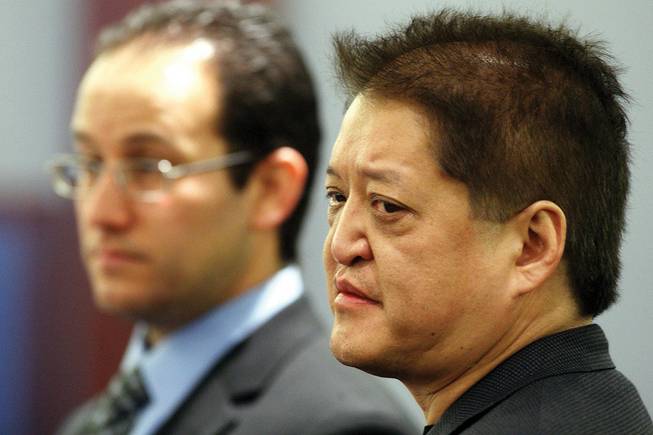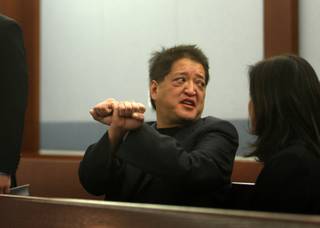
STEVE MARCUS / LAS VEGAS SUN FILE
Terrance K. Watanabe appears in court in February with attorney Richard Schonfeld in Las Vegas. Schonfeld is the law partner of David Chesnoff.
Monday, May 18, 2009 | 2 a.m.
Sun Archives
- Grand jury indicts high roller in $14.7M casino debt case (4-29-2009)
- High roller posts $1.5 million bail to avoid jail stay (2-18-2009)
- Philanthropist allegedly owes $14.7 million to Rio, Caesars (2-4-2009)
- Feds press probe of ex-Fry’s executive (2-2-2009)
- Casino profile details luxurious lifestyle of former Fry’s executive (1-14-2009)
- Feds looking into high roller’s debt payments (12-31-2008)
High-rolling Nebraska philanthropist Terrance K. Watanabe is mounting an unusual defense to charges he failed to pay $14.7 million in Strip gambling debts.
He is accusing Caesars Palace and the Rio, both owned by Harrah’s Entertainment, of providing him with a steady flow of alcohol and — in the case of Caesars Palace — prescription painkillers as his losses increased.
His Las Vegas attorney, David Chesnoff, lays out the defense in a letter to prosecutors, claiming that casino employees will testify that the resorts kept the prolific gambler in a constant state of intoxication in the latter months of 2007 in violation of state gaming regulations.
The Las Vegas Sun has obtained a copy of the seven-page letter, which maintains that Watanabe was in such an incoherent state that he was “incapable of forming the criminal intent” to avoid paying his gambling debts.
Harrah’s Entertainment spokesman Gary Thompson declined to comment on the allegations, saying the company has a long-standing policy of not commenting on legal matters.
A county grand jury indicted Watanabe, 52, on April 29 on theft and bad-check charges, stemming from gambling losses of $12 million at Caesars and $2.7 million at the Rio from October through December of 2007.
Those losses pale when compared with Watanabe’s massive overall losses at Harrah’s Entertainment casinos during 2007, Chesnoff said in the letter.
Watanabe, who is to be arraigned in District Court on Wednesday, lost an astounding $112 million that year at Harrah’s casinos, including $94.1 million at Caesars Palace and $12.2 million at the Rio, Chesnoff said.
With the exception of the $14.7 million in dispute, all of that money was paid back to the casinos through wire transfers, Chesnoff said.
Watanabe’s wealth comes from the Omaha-based Oriental Trading Co., a wholsesale novelty importer founded by his father. The younger Watanabe ran the company from 1977 until 2000, when he sold it.
Chesnoff sent the letter to Chief Deputy District Attorney Bernie Zadrowski, who runs the bad check unit, several days before Watanabe’s indictment, asking the prosecutor to present the information to the grand jury in the hope of derailing the charges.
Zadrowski said he gave the grand jury the letter, but the panel decided to indict Watanabe anyway.
Chesnoff declined to comment to the Sun about the allegations he raised in the letter.
But the Los Angeles crisis management firm Watanabe hired to help him deal with the criminal investigation issued a statement from Chesnoff.
“We look forward to presenting our case in court and to having the charges against Mr. Watanabe dismissed,” the statement said. “Mr. Watanabe has numerous strong defenses that will demonstrate that he could not and did not commit the crime with which he has been charged because he did not, among other things, have the requisite intent to commit the alleged crime.”
According to the letter, the most intriguing aspect of Watanabe’s defense centers on statements from three casino employees who spent a lot of time with Watanabe in 2007. All three will testify that Watanabe appeared in a constant state of intoxication when he gambled the latter part of 2007, often slurring his speech and having trouble walking, the letter said. Watanabe even occasionally would fall asleep at the gaming tables and would be allowed to gamble again once he woke up.
All three witnesses also will testify that Caesars Palace employees supplied Watanabe with the prescription painkiller Lortab, a narcotic that can be addictive, the letter alleged.
Nevada gaming regulations prohibit casinos from allowing “visibly intoxicated” players to continue to gamble.
“Certainly, that type of behavior on the part of a licensee would not be acceptable, but at this point we don’t have a complaint to investigate that I’m aware of,” said Jerry Markling, chief of enforcement at the Nevada Gaming Control Board. “If a complaint is made to us, we’ll certainly look into it.”
The letter said that Christopher Corso, a longtime Caesars Palace bellman who indicated he was assigned full-time to take care of Watanabe’s needs, told defense attorneys that no Caesars Palace or Rio employees “ever attempted to cut off or even slow down Mr. Watanabe’s drinking or gambling.”
Corso also alleged in the letter that Caesars Palace provided Watanabe with “controlled substances, namely prescription painkillers,” from September through December 2007. The letter said Corso will testify that he once saw a Caesars security officer deliver a “children’s candy box” containing Lortab to Watanabe’s room. The box was delivered on behalf of another casino employee, he contends.
Stuart Mitchell, a Red Rock Resort roulette dealer who befriended Watanabe when he gambled at the locals casino, indicated that he often accompanied Watanabe on gambling visits to Caesars Palace in late 2007, Chesnoff said in the letter.
Mitchell told defense lawyers that he learned at the time that Caesers employees were giving Watanabe painkillers. The drugs, combined with the alcohol, “significantly intoxicated and impaired” Watanabe, causing him to gamble more recklessly, the letter charged.
“Rather than assisting Mr. Watanabe in dealing with his intoxication, the Caesars Palace floor managers and pit bosses would turn their heads,” the letter quoted Mitchell as alleging.
Mitchell also raised concerns about Watanabe’s treatment in an e-mail to Zadrowski the day before Watanabe was indicted. Zadrowski gave the e-mail to the grand jury.
Another defense witness, George Denten, a former Caesars Palace security officer personally assigned to Watanabe in 2007, will testify that he didn’t recall ever seeing Watanabe in a sober state during the 25 to 30 hours a week he spent with him from June through December of that year, the letter said.
Denten alleges that he saw a note posted on Watanabe’s hotel room door in late October or early November 2007 that said “the pills” had been delivered to the room and Watanabe was to call if he needed more.
“Mr. Denten understood that ‘pills’ meant Lortabs,” the letter said.
According to the letter, Denten took Watanabe to “rehab for alcohol, drug and gambling” addictions, and that Watanabe completed treatment through an inpatient program.
Chesnoff gave Zadrowski the names, addresses and phone numbers of the three witnesses and the others he named in the letter, including Watanabe’s sister, who lives in San Jose Calif., in the hope the prosecutor would call them to testify before the grand jury.
But Zadrowski said the only defense witness he was able to arrange to testify was Wilson Ning, a Harrah’s vice president of Asian marketing stationed at the Rio.
In his letter, Chesnoff said Ning opposed efforts by Caesars Palace to increase Watanabe’s credit limit in June 2007 because he believed Watanabe was “out of control” and showing signs of being a problem gambler.
But according to grand jury transcripts released last week, Ning denied that he ever saw Watanabe intoxicated at the Rio, and said he did not believe casino employees at Caesars Palace would have given Watanabe prescription painkillers.
Ning, however, also told the grand jury that he had limited contact with Watanabe, and Zadrowski never asked him if he thought Watanabe might have a gambling addiction.
Transport yourself to the opulent and excessive Roman Empire at Caesars Palace. But the ever-changing Caesars Palace is far from ancient. The hotel and casino is constantly raising the bar for what visitors can expect in a Vegas resort experience.
Caesars Palace features 3,348 rooms and suites in five towers, including the new luxury boutique Nobu Hotel and Restaurant, which opened Feb. 4, 2013, in the totally remodeled Centurian Tower. Caesars features 129,000 square feet of gaming space, including the Strip’s largest poker room and a 250-seat sports book. Other amenities include about two dozen restaurants, a four-level shopping mall, four pools, a spa, Pure and Poetry nightclubs and Pussycat Dolls.
Dining options include restaurants from world-renown chefs Guy Savoy, Wolfgang Puck, Bobby Flay, Gordon Ramsay and, on Feb. 4, 2013, Nobu Matsuhisa.
You never know what characters you’ll run into at Caesars with regular performers like Jerry Seinfeld, Bette Midler, Elton John and maybe even the emperor himself.
Carnival lasts all year at the Rio. With a float occasionally passing overhead and dropping beads while feathered dancers fire up the gamblers below, the Rio tries to keep its 120,000-square foot casino jumping with excitement. Special Brazilian mixed-drinks are also served throughout the casino. The hotel suites tend to be larger than similar priced rooms on the Strip and many offer excellent views with floor to ceiling windows.
The Rio offers some quality shows like "Penn & Teller" and "Chippendales." Many come to the Rio for the nightlife at the VooDoo Lounge, located on the 51st floor, or McFadden's Irish Pub on the casino level.
Others come for a bit relaxation at the Rio Spa or pool area and still others come to shop at the hotel's 60,000 square feet of shops. In each of these endeavors, the Rio attempts to make the experience a bit more fun and spontaneous.
The Rio also offers guests a variety of dining choices from all-American food at the All-American Bar & Grille to Gaylord India Restaurant for something a little spicier and even Carnival World Buffet for the indecisive.


Join the Discussion:
Check this out for a full explanation of our conversion to the LiveFyre commenting system and instructions on how to sign up for an account.
Full comments policy